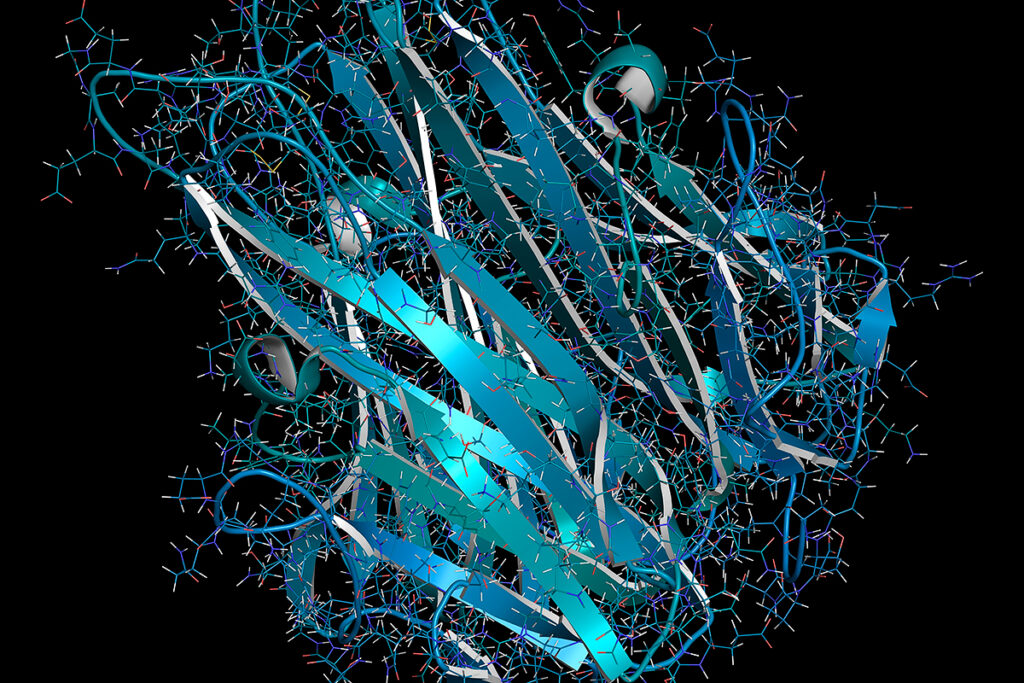Overactivation of the immune system in COVID-19 is a life-threatening condition. An inappropriately strong immune response can trigger a cytokine storm, hyper-inflammation that can lead to acute respiratory distress syndrome and fatal multiple organ failure. In addition, the cytokine storm of COVID-19 may contribute to vascular damage and thrombosis.
What Mechanisms Can Resist Cytokine Storm and Thrombosis in COVID-19
Janus Kinase Inhibitor (JAK) 1/2 blocks the JAK-STAT signaling pathway, thereby suppressing the production and release of potent inflammatory cytokines from various hyperactivated immune cells. Thus, the JAK1/2 inhibitor has anti-inflammatory and immunosuppressive properties. In addition, a JAK1/2 inhibitor may reduce the risk of thrombosis by inhibiting inflammation-driven activation of leukocytes, platelets, endothelium, and blood coagulation.
The innate immune system cells, neutrophils, are also involved in thrombogenesis in COVID-19. In response to inflammation, the level of neutrophils increases. Activated neutrophils throw out the contents of their nucleus – extracellular traps, a network in which pathogens become entangled. RBCs and platelets adhere to the same network. This is how netosis occurs, which contributes to thrombosis.
Studies have shown that interferon-alpha-2 or interferon-beta (IFN) can weaken inflammasomes – a protein complex responsible for activating inflammation – and netosis. The JAK1/2 inhibitor also prevents the formation of extracellular traps for neutrophils. In addition, IFN inhibits viral replication.
Danish and American scientists investigated how effective the treatment of COVID-19:
- IFN-alpha-2 or IFN-beta at an early stage of the disease;
- JAK1/2 inhibitor as monotherapy or in combination with IFN + JAK1/2 inhibitor at a later stage of the disease.
Treating Rationale for COVID-19 Patients with a Janus Kinase 1/2 Inhibitor
Can treatment with a JAK1/2 inhibitor improve clinical outcomes in patients with severe coronavirus infection
The cause of acute respiratory failure in COVID-19 is hyperinflammation of the lungs, which is part of the cytokine storm syndrome.
Ruxolitinib is a JAK1/2 inhibitor used to treat chronic blood cancers such as myelofibrosis and polycythemia vera (MPN). Chronic inflammation is the driving force behind the development and progression of these cancers.
Within hours/days, ruxolitinib relieves symptoms associated with inflammation, and the enlarged spleen shrinks within weeks or months. Some patients also suffer from inflammatory diseases of the connective tissue, the symptoms of which improve markedly when treated with ruxolitinib. The beneficial effects of ruxolitinib treatment in patients with MPN are due to the rapid reduction in elevated levels of circulating inflammatory cytokines.
COVID-19 can cause secondary hemophagocytic lymphohistiocytosis (HLH) syndrome. HLH is a type of cytokine storm. HLH causes pathological activation of macrophages and cytotoxic cells that destroy blood cells.
Studies in mice have confirmed the importance of inflammatory cytokines in developing HLH. Also, these studies have shown the effectiveness of JAK1/2 inhibition for the immediate resolution of HLH:
- Animal model of hemophagocytic lymphohistiocytosis (HLH): CD8+ T cells and interferon-gamma are required for this disease
- Storm mitigation: ruxolitinib in HLH
- Janus kinase inhibition reduces inflammation and improves disease course in mouse models of hemophagocytic lymphohistiocytosis
- Therapeutic effect of JAK1/2 blockade on manifestations of hemophagocytic lymphohistiocytosis in mice
- HLH: Taming the Storm
- Mechanisms of action of ruxolitinib in mouse models of hemophagocytic lymphohistiocytosis
Clinical studies have also shown ruxolitinib to be highly effective for HFH:
- Ruxolitinib as first-line treatment for secondary hemophagocytic lymphohistiocytosis: a single patient experience
- Ruxolitinib as a first-line treatment for secondary hemophagocytic lymphohistiocytosis: a second experience
- Resolution of secondary hemophagocytic lymphohistiocytosis after treatment with the JAK1/2 inhibitor ruxolitinib
- Ruxolitinib in secondary hemophagocytic lymphohistiocytosis: the first clinical case
- Ruxolitinib for the treatment of lymphoma-associated hemophagocytic lymphohistiocytosis: a caution
- Ruxolitinib in adult patients with secondary hemophagocytic lymphohistiocytosis: an open-label, single-center pilot study
- Recommendations for the treatment of hemophagocytic lymphohistiocytosis in adults
Interestingly, in some of these patients, hypercytokinemia was unresponsive to high doses of glucocorticoids.
Several studies have shown that treatment with a JAK1/2 inhibitor, either alone or in various combinations, may benefit patients with COVID-19 infection:
- Combined ruxolitinib and eculizumab for the treatment of severe acute respiratory distress syndrome associated with SARS-CoV-2: a controlled study
- Inhibition of the JAK-STAT pathway and its implications for COVID-19 therapy
- Ruxolitinib for the treatment of acute respiratory distress syndrome caused by SARS-CoV-2 (ARDS)
- Attenuated SARS-CoV-2 infection in an allogeneic hematopoietic stem cell transplant patient receiving ruxolitinib
- Low-dose ruxolitinib in combination with a glucocorticoid for severe SARS-CoV-2 pneumonia
- Ruxolitinib in the treatment of severe COVID-19: a multicenter, single-blind, randomized controlled trial
- Janus kinase 1/2 inhibitor ruxolitinib for COVID-19 with severe systemic hyperinflammation
- Use of the JAK1/2 inhibitor ruxolitinib in severe COVID-19: a prospective observational study
The rationale for these studies is based on the mechanisms underlying the anti-inflammatory and immunosuppressive effects of ruxolitinib.
Baricitinib, another JAK1/2 inhibitor, is used to treat patients with rheumatoid arthritis. In addition to reducing inflammation, this drug reduces the penetration of SARS-CoV-2 into cells.
Recently, a large randomized trial showed that the combination of baricitinib + remdesivir, compared with remdesivir alone, accelerated recovery time and clinical improvement in patients with COVID-19, in particular among those receiving high-flow oxygen or non-invasive ventilation.
Ruxolitinib effectively treats severe graft-versus-host disease (GVHD), even in patients refractory to high doses of steroids. That occurs due to its potent immunosuppressive and anti-inflammatory properties. Interestingly, COVID-19 infection in an allogeneic hematopoietic stem cell transplant patient was attenuated by treatment with ruxolitinib.
Netosis has been implicated in thrombosis and organ damage in patients with COVID-19. Ruxolitinib inhibits netosis in patients with MPN and may also act in patients with COVID-19.
By suppressing B cells, ruxolitinib may reduce the production of anti-IFN autoantibodies and prevent the worsening of IFN deficiency, which is also caused by the SARS-CoV-2 virus itself.
Treating Rationale for COVID-19 Infection with Interferon-Alpha-2 or Beta
Type I interferons – alpha-2 / beta – have a powerful antiviral effect. They inhibit viral replication and support and enhance the immune response to speed up the clearance of the virus from the body.
During the previous coronavirus SARS-CoV outbreak in Toronto in 2003, IFN-alpha-2 accelerated lung recovery. SARS-CoV-2 is more sensitive to type I interferons than SARS-CoV. Interferon-alpha-2b and interferon-beta are used to treat COVID-19.
In moderate COVID-19, nebulized IFN-alpha-2b shortened the duration of virus shedding and reduced acute inflammatory markers such as C-reactive protein and interleukin (IL) IL-6, which correlated with a reduction in virus shedding. IL-6 is a predictor of disease severity and mortality in acute respiratory distress syndrome. Lowering inflammatory markers, including IL-6, may improve prognosis in COVID-19. To do this, targeting the SARS-CoV-2 virus with IFN-alpha-2b is a more rational approach than targeting the symptoms of the virus by blocking the IL-6 receptor.
A multicenter study of the safety and efficacy of early interferon treatment showed that early IFN therapy is associated with a favorable response in patients with COVID-19.
The addition of injectable IFN-beta to the antiviral agents lopinavir-ritonavir and ribavirin in patients with mild to moderate COVID-19 significantly reduced the duration of virus shedding, relieving symptoms faster, and reduced hospital stays. It is important to note that IFN-beta was administered only less than 7 days after the onset of symptoms.
Inhaled IFN-beta reduced mortality in Chinese patients with COVID-19. It accelerated virus clearance and clinical improvement. No side effects were observed.
SARS-CoV-2 suppresses the response of IFN types I and III. Severe COVID-19 is characterized by a very weak IFN I and III response, combined with a cytokine storm with highly elevated serum levels of IL-6 and TNF-α. French scientists also reported low plasma levels of IFN-alpha-2 in COVID-19. Low levels of IFN-alpha-2 preceded clinical deterioration. Serum IFN activity in patients with severe or critical COVID-19 was also lower than in mild and moderate disease patients. Since IFN-I deficiency is associated with hyperinflammation and lower viral clearance, early treatment with interferon may prevent the virus’s rapid spread in the body and the subsequent cytokine storm.
In mice, interferon-beta reduced pulmonary fibrosis. Interferon-beta may improve outcomes in patients with acute respiratory distress syndrome from COVID-19.
British Scientists have investigated the genetic mechanisms of critical COVID-19. Increased expression of the interferon receptor IFNAR2, which is essential for an adequate response to viral infections, reduces the risk of severe COVID-19. It implies that IFNAR2 plays a protective role against severe COVID-19. Treatment of IFN in patients with COVID-19 may reduce the risk of critical illness.
In patients at high risk for severe disease and mortality from COVID-19, such as the elderly and obese, IFN responses are impaired. Thus, the elderly and obese patients may benefit from early treatment with interferon. The concept of an association between type I IFN deficiency and susceptibility to COVID-19 infection and disease severity is supported by the mild course of COVID-19 in most children, who have a much stronger type I IFN response than the elderly.
Interferon normalizes or significantly suppresses activated thromboinflammatory genes in patients with MPN. Regular or down-regulation of thromboinflammatory genes by IFN could also likely reduce netosis in patients with COVID-19 and minimize the risk of thrombosis. Oxidative stress is also closely associated with thrombogenesis. IFN-alpha-2 significantly reduces the expression of oxidative stress genes and activates the expression of antioxidant defense genes in patients with MPN.
In a mouse model of arthritis, IFN-alpha-2 reduced the production of pro-inflammatory cytokines IL-6, IL-12, and TNF-α and increased serum levels of the anti-inflammatory cytokine TGF-β. Early administration of IFN-alpha-2 to patients with COVID-19 may reduce elevated levels of cytokines necessary for the development of the cytokine storm: IL-1β, IL-6, IL-12, TNF-α, and IFN-gamma.
Type I IFNs stimulate the rapid differentiation of monocytes into activated dendritic cells. IFN also triggers the activation of NK cells. These factors are significant for the rapid development of a robust antiviral response.
Combination Therapy Rationale with Interferon and JAK1/2 Inhibitor for COVID-19
The experimental and clinical studies described above have demonstrated that interferon-alpha-2/beta and JAK1/2 inhibitors involve several mechanisms that suppress COVID-19. The scientists suggested that combining these drugs would be more effective than monotherapy.
Could JAK/STAT inhibition reduce the effectiveness of IFN?
Clinical studies in patients with MPN have shown that IFN and a JAK1/2 inhibitor act synergistically. The half-life of ruxolitinib is only a few hours. It leaves a window of several hours per day for IFN signaling.
Inflammation impairs IFN signaling through the degradation of the interferon receptor. JAK/STAT inhibition attenuates inflammation
Interferon inhibits virus replication and shedding and stimulates virtually all immune cells. Both interferons and the JAK1/2 inhibitor attenuate hyperinflammation, thereby reducing the likelihood of a life-threatening cytokine storm.
Inflammation is associated with a violation of the effectiveness of IFN-alpha-2. All effects of IFN-alpha-2/beta are manifested through interaction with type I IFN receptors, which consist of IFNAR1 and IFNAR2 chains. Inflammation suppresses IFNAR1 and is associated with resistance to IFN.
The inflammatory cytokines interleukin 1-α (IL1-α) and TNF-α, elevated in hyperinflammatory COVID-19 patients, stimulate IFNAR1 degradation and attenuate IFN-alpha-2 signaling. Similarly, the resistance to IFN-alpha-2 in patients with hepatitis could be explained by oxidative stress that impairs IFN-alpha-2 signaling.
Patients with COVID-19 have elevated levels of inflammatory cytokines such as IL1-α and TNF-α, with the highest levels in patients with impending respiratory failure. Therefore, treating patients with COVID-19 with IFN-alpha-2 is possible only at the earliest possible stage of the disease, when the inflammatory state is less pronounced. Administration of IFN-alpha-2 later, when the inflammatory load increases and therefore the effectiveness of IFN is reduced, can be dangerous.
Mathematical modeling studies of COVID-19 infection support early treatment with IFN. The sooner IFN is introduced, the better the response to treatment. Anti-inflammatory or antiviral treatment combined with interferon effectively shortens the time to recovery.
A Danish study confirmed the safety and efficacy of combination therapy with a JAK1/2 inhibitor and IFN in patients with myelofibrosis and polycythemia vera. Patients rapidly resolved inflammation-induced symptoms of MPN.
These studies demonstrated that IFN-alpha-2 and ruxolitinib act synergistically. Therefore, combination therapy requires lower doses of IFN and ruxolitinib to normalize elevated white blood cell and platelet counts.
Conclusion
Combination treatment of COVID-19 with ruxolitinib and interferon may shorten virus shedding and symptomatic response times, reduce the number and severity of symptoms, and reduce the risk of complications such as thrombosis and multiple organ failure.
Useful article, necessary information? Share it!
Someone will also find it useful and necessary:



